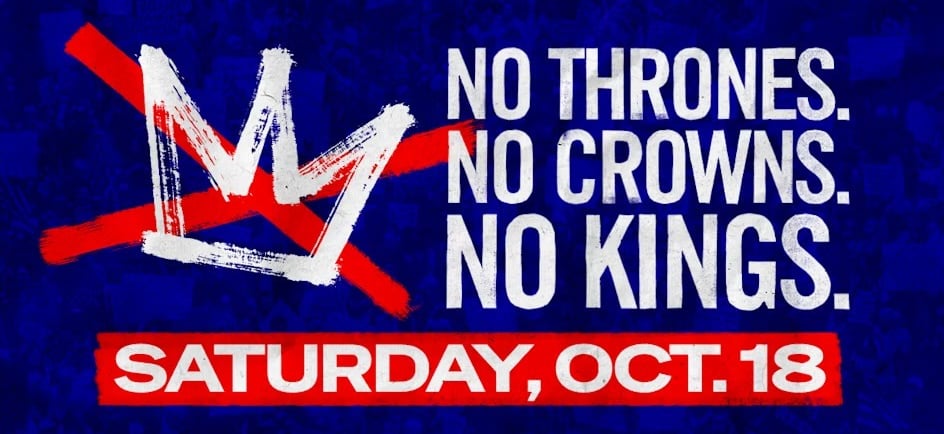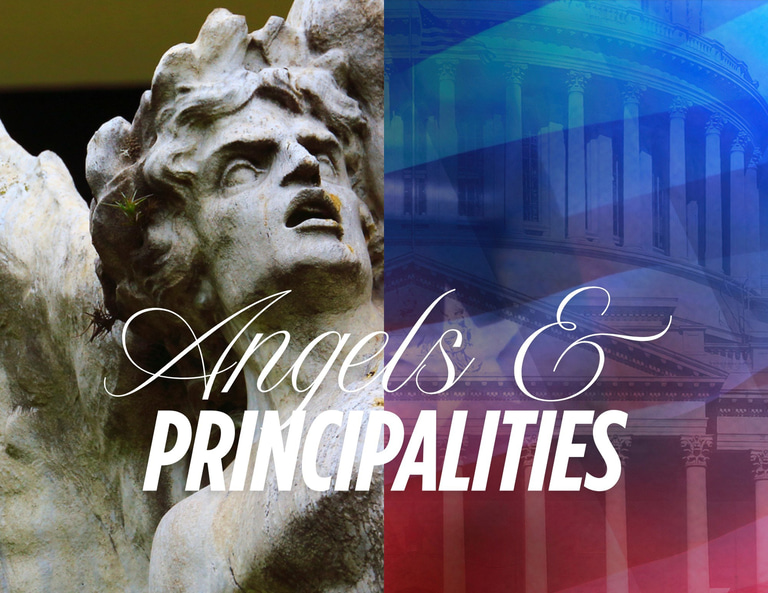Frank DuNN: Conversations at the junction of faith and politics
Why NO KINGS?
It is not enough to say NO KINGS. If Democracy is worth defending, we must be able to say clearly why that's so.
Frank Dunn
10/16/20255 min read


“If I had to drag myself off my deathbed, I’d do it to be just one more face at the NO KINGS protest on Saturday.” So I spoke to my husband yesterday.
I’m writing about NO KINGS two days before the events themselves. I don’t want to wait to comment until I am either elated by massive turnouts all over the world or dejected because the outpourings were far weaker than predicted. I read yesterday that protests in solidarity with the American people supporting democracy are being organized in at least 18 other countries around the world. I’m not naïve enough to think that this means the tide on earth has turned in favor of democracy. I do think it’s evident that people around the world have long looked to the United States for sane, reliable, and responsible, and are now disturbed that our nation appears to have chosen leaders that are acting insanely, and who are both unreliable and irresponsible. Obviously they are following old scripts from authoritarians past. Unlike some of those authoritarians, they are neither coherent nor competent.
It isn’t my purpose in writing this blog to palaver about politics. Enough of that is available elsewhere if that’s what you want. It is my aim to look at the interplay of faith and politics. Faith is much broader than religion; but, since we often experience and practice faith developed within faith traditions, I continue to turn to my grounding in the Bible. Just so you know, I don’t absolutize the Bible, nor read it as if it were an answer book, nor use it like a Ouija board. Nor is it the only source of wisdom I trust. It just happens to be home base for me.
Because it is, I’m connecting NO KINGS with the story of NO KINGS contained in 1 Samuel:
So Samuel reported all the words of the LORD to the people who were asking him for a king. He said, ‘These will be the ways of the king who will reign over you: he will take your sons and appoint them to his chariots and to be his horsemen, and to run before his chariots; and he will appoint for himself commanders of thousands and commanders of fifties, and some to plough his ground and to reap his harvest, and to make his implements of war and the equipment of his chariots. He will take your daughters to be perfumers and cooks and bakers. He will take the best of your fields and vineyards and olive orchards and give them to his courtiers. He will take one-tenth of your grain and of your vineyards and give it to his officers and his courtiers. He will take your male and female slaves, and the best of your cattle and donkeys, and put them to his work. He will take one-tenth of your flocks, and you shall be his slaves. And in that day you will cry out because of your king, whom you have chosen for yourselves; but the LORD will not answer you in that day.’ [1 Samuel 8:10-22]
In other words, you want a king? Be aware that a king will take away your freedom and rip you off. You might want to think about that some more.
The whole passage is not a 21st century liberal Paean to Democracy. At stake is a theological issue. Scholars, led by the 19th century Julius Wellhausen, have long understood that underneath the present text are two strands that have been woven together into a single narrative, much as the four sources of the Pentateuch were. Wellhausen posited that these came from two different periods. The older source is pro-monarchical and comes from the period when the royal house of Judah flourished. The newer source most likely comes out of the experience of the Exile, when one or more of its authors looked upon the monarchy as the lynchpin of the downfall of Israel.
At any rate, there was, and is, plenty of disagreement about the value of monarchy, and thus there is a strong strain of “NO KINGS!” embedded in the narrative. To read the entire histories of Judah and Israel is to discover, not surprisingly, that some monarchs are better than others. And to read the post-Exilic history is to discover that the Jews hardly fared better when they were under the thumb of other leaders, especially puppet rulers like the Herodian kings who were clients of Rome.
All of that forms the backdrop to the ironic passage in the Passion Narrative when, especially as graphically told in the Gospel According to John, Jesus is mocked and derided as “king of the Jews.” Not all kings are all-powerful.
Indeed, if that is the lesson to be leaned by monarchs, not only George III and Charles I of England, Louis XVI and Marie Antoinette of France, but also the royal houses of more modern times have paid big prices for being on the wrong side of the populace in action.
Behind the struggle for and against kingship in 1 Samuel which issues in the coronation of tragic Saul lies the question the prophet Samuel puts to the people: what about Yahweh Adonai [LORD God]? That is the never-ending problem of theology. Who or what is the source and telos of ultimacy? Who is “Lord of all?” Not just biblical stories but many tales around the world continue to raise questions about what true power is and where it belongs. Star Wars is a good example. Not only is there a cosmic struggle for power, but the struggle always involves ultimate questions about Good and Evil, forces that play out in wars of all scopes and sizes.
That, I believe, is what NO KINGS, October 18, 2025, is about. We frame it as a demonstration of “democracy,” and so it is. But it will not do to stop there. We must (I choose the imperative carefully) understand why defending democracy is so important. We do know, after all, that democratic government doesn’t function perfectly. The reason it is worth being the hill we are willing to die on is that it’s precisely the bulwark to prevent what Samuel warned the people clamoring for a king against. The things people care about—the things the text attributes to Samuel in his skepticism regarding a monarch—are our children, the integrity of the land, quality food, safety, peace, and our very freedom. Those things are never certain, or even realistic goals and hopes, if the government is run by, and manipulated to enrich autocrats, technocrats, and oligarchs, who are the “officers and courtiers” of the present day.
The last thing Jesus ever wanted was to be an earthly ruler. Of that there can be no doubt. Nothing he ever taught or did smacked of amassing power. In every aspect of the story we revere, however factual parts of it may fail to be, his is the story of passion, of self-emptying, of becoming obedient, of washing feet and feeding hungry stomachs and healing people who had no health care let alone insurance, who lacked status and prestige and in a whole lot of cases, decent reputations.
I’m haunted by his question: “Why do you call me ‘Lord, Lord,’ and do not the things that I say?”
That question is driving me not just to show up at a demonstration, important as that is, but to spend the rest of my days trying to do the things he’s taught me.
